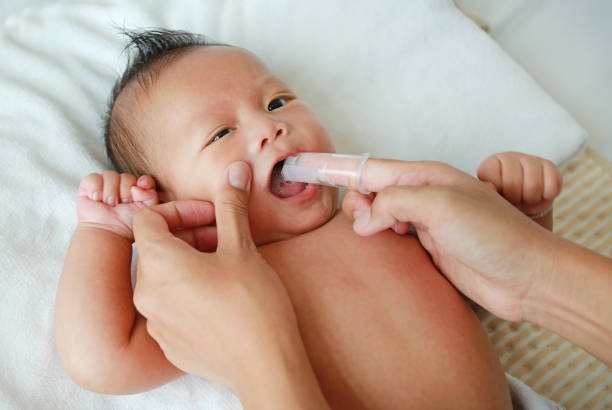Parenthood, especially in those first few weeks, is a whirlwind of love, questions, late-night Googling, and moments you never knew you’d cherish this much. And somewhere between diaper changes and lullabies, you’ll probably find yourself wondering: “Do I need to clean my baby’s tongue?” The short answer? Yes. The long answer? Let’s talk about it.
Wait, Babies Get Dirty Tongues?
Yes, they do. And no, it’s not because they’ve been sneaking cookies behind your back. A newborn’s mouth, especially the tongue, can gather milk residue, especially if they’re breastfeeding or bottle-feeding regularly (which is, you know, all the time).
This residue can appear white or creamy. Sometimes, it’s totally normal. Other times, it might be a sign of oral thrush (a fungal infection that’s common, but annoying). So how do you tell the difference, and what should you do about it? Let’s break it down.
What’s Normal and What’s Not?
A little white coating? Often harmless milk residue. But if that coating:
- Sticks around for days
- Spreads to the inner cheeks or gums
- Looks thick, like cottage cheese
- Doesn’t wipe off easily
…then we might be dealing with oral thrush. If you’re unsure, don’t play guessing games, check with your pediatrician.
Okay, So How Often Should I Clean My Baby’s Tongue?
This is where things get surprisingly chill: once a day is enough. You don’t need to scrub it down like you’re polishing silver. Just a gentle clean during bath time or after the last feed of the night can help keep things fresh.
And here’s a bonus: this mini oral care routine also gets your little one used to having their mouth cleaned, making brushing easier down the line.
Tools of the Trade (Yes, Your Finger Counts)
You don’t need fancy gear. Here’s what works:
- Clean gauze or a soft muslin cloth
- A soft silicone baby finger brush
- Sterile water (boiled then cooled)
Pro tip? Some parents swear by using a clean, damp washcloth wrapped around their finger. It’s simple, it works, and your baby won’t think you’re trying to do dental surgery on them.
Avoid toothpaste at this stage. It’s way too early for that.
Step-by-Step: Cleaning Baby’s Tongue Without Tears (Yours or Theirs)
- Wash your hands – We’re talking thoroughly.
- Wrap gauze or cloth around your index finger.
- Dip it in sterile water – Just enough to moisten.
- Hold your baby comfortably – Cradled in your arm or on your lap.
- Gently open their mouth – You can softly press their chin down.
- Rub the tongue in small circles – Focus on the middle, where buildup happens most.
- Do a quick sweep along the gums and inner cheeks – Just once or twice.
That’s it. No pressure, no rush. If your baby squirms or fusses, take a break and try again later. This isn’t a performance, it’s just care.
But What If My Baby Hates It?
Totally normal. They might wiggle, fuss, or shoot you a betrayed look that says, “Et tu, Mama?” But with consistency, they’ll get used to it.
Make it part of a routine, maybe even a soothing moment before bed. Sing to them. Talk them through it. Let them hold the cloth for fun (and probably try to eat it).
Over time, it won’t just get easier, it’ll become a small bonding moment.
Bonus Tip: Watch for Thrush Triggers
If you’re breastfeeding and dealing with thrush, your baby might keep getting reinfected. Thrush can pass back and forth between your baby’s mouth and your nipples. Fun, right? (No.)
Here’s what helps:
- Boil pacifiers and bottle nipples daily
- Air out nipples after feeds
- Apply antifungal cream if prescribed
- Treat both baby and mama if needed
Talk to your pediatrician and your OB/GYN. Getting rid of thrush is a tag-team job.
Cleaning Tongue, Building Habits
What seems like a tiny thing, cleaning your newborn’s tongue, sets the stage for bigger habits later on. It’s like laying bricks for the foundation of oral hygiene. By the time teeth show up, your baby won’t be freaked out by having their mouth touched.
And you’ll be way ahead of the curve.
What Not to Do (Because, Yes, Some Mistakes Are Common)
- Don’t use toothpaste or any cleaning gel unless your doctor says so
- Don’t scrape too hard or poke too deep
- Don’t clean more than once a day (it’s not necessary)
- Don’t panic if your baby gags a little it’s normal at first
Remember: gentle, slow, calm. That’s the mantra.
When to Call the Doctor
Sometimes, even the most relaxed baby routines need backup. Call your pediatrician if:
- The white patches won’t go away
- Your baby has trouble feeding
- They seem in pain or extra fussy
- You notice cracks or redness at the corners of their mouth
It’s always better to check. No one ever regrets asking their pediatrician too many questions.
Final Thoughts: Tiny Mouth, Big Deal
Your baby’s mouth is their first way of exploring the world, through feeding, cooing, and yes, those irresistible gummy smiles. Keeping it clean isn’t about perfection. It’s about gentle care, steady routines, and paying attention.
You don’t need to be a dental expert. Just a loving parent with a damp cloth and a little patience.
And honestly? That’s more than enough.
Sources You Can Trust (and Bookmark)
- American Academy of Pediatrics (AAP)
- La Leche League International
- Mayo Clinic
- National Institutes of Health (NIH)
Got questions or want to share your tricks for a squirmy baby? Leave a comment below—because chances are, someone else is wondering the same thing.
